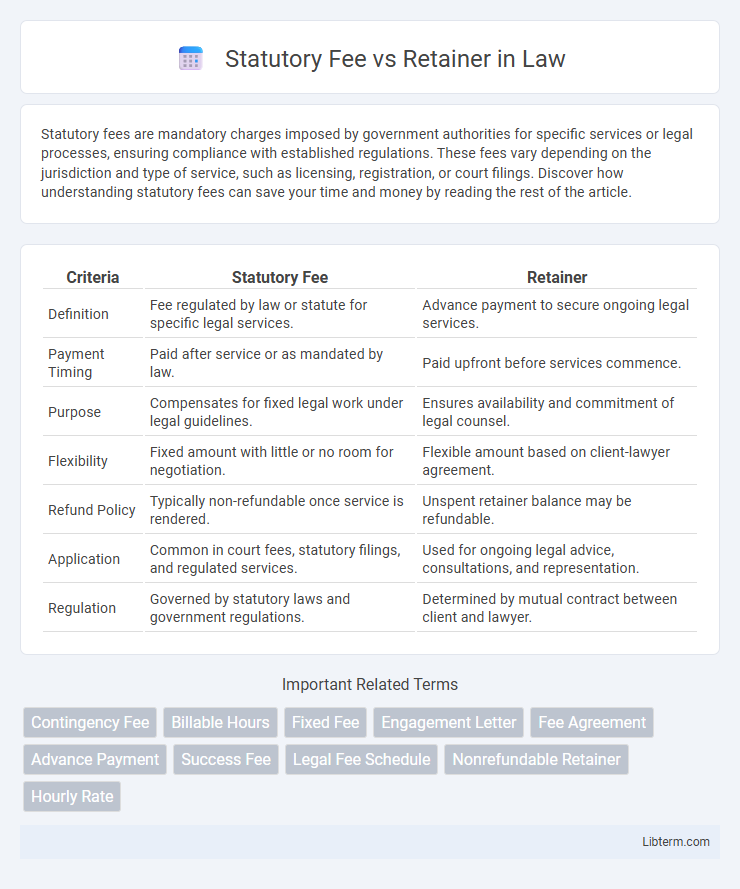Statutory fees are mandatory charges imposed by government authorities for specific services or legal processes, ensuring compliance with established regulations. These fees vary depending on the jurisdiction and type of service, such as licensing, registration, or court filings. Discover how understanding statutory fees can save your time and money by reading the rest of the article.
Table of Comparison
| Criteria | Statutory Fee | Retainer |
|---|---|---|
| Definition | Fee regulated by law or statute for specific legal services. | Advance payment to secure ongoing legal services. |
| Payment Timing | Paid after service or as mandated by law. | Paid upfront before services commence. |
| Purpose | Compensates for fixed legal work under legal guidelines. | Ensures availability and commitment of legal counsel. |
| Flexibility | Fixed amount with little or no room for negotiation. | Flexible amount based on client-lawyer agreement. |
| Refund Policy | Typically non-refundable once service is rendered. | Unspent retainer balance may be refundable. |
| Application | Common in court fees, statutory filings, and regulated services. | Used for ongoing legal advice, consultations, and representation. |
| Regulation | Governed by statutory laws and government regulations. | Determined by mutual contract between client and lawyer. |
Introduction to Legal Payment Structures
Statutory fees are fixed payment amounts mandated by law for specific legal services, ensuring transparency and consistency across cases. Retainers function as upfront deposits paid to secure a lawyer's availability and cover initial costs, often credited against future hourly billing or expenses. Understanding these fundamental legal payment structures helps clients manage budgeting and expectations throughout the legal process.
What is a Statutory Fee?
A statutory fee is a legally mandated payment set by government regulations or statutes that professionals must charge for specific services. These fees ensure uniform pricing and are commonly applied in legal, medical, and financial sectors to maintain transparency and fairness. Unlike retainers, statutory fees are fixed and non-negotiable, reflecting compliance with established legal guidelines.
Understanding Retainer Agreements
Retainer agreements establish a predetermined fee paid upfront to secure legal services, contrasting with statutory fees, which are fixed by law for specific services. These agreements outline the scope of representation, payment terms, and conditions for replenishing the retainer, ensuring clarity between attorney and client. Understanding the nuances of retainer agreements helps clients anticipate costs and attorneys manage workload effectively.
Key Differences Between Statutory Fees and Retainers
Statutory fees are fixed charges mandated by law or regulatory guidelines that professionals must adhere to, while retainers are upfront payments made to secure services and cover future work. Statutory fees provide transparency and standardization for legal or professional services, whereas retainers offer flexibility and assurance of service availability. The key difference lies in statutory fees being predetermined and non-negotiable, in contrast to retainers, which vary in amount and terms based on client agreements.
Advantages of Statutory Fees
Statutory fees offer clear advantages by providing fixed, government-regulated charges that ensure transparency and predictability in legal costs. These fees eliminate ambiguity in billing, reducing disputes between clients and service providers. Clients benefit from standardized rates, which help in budgeting and prevent unexpected expenses during legal transactions.
Benefits of Retainer Arrangements
Retainer arrangements offer clients continuous access to legal services, providing cost predictability and prioritization by attorneys. Unlike statutory fees, retainers enable proactive and strategic consultation, ensuring attorneys are readily available for ongoing legal needs. This fosters stronger client-lawyer relationships and more efficient case management.
Disadvantages of Each Payment Model
Statutory fees often lack flexibility, resulting in clients paying fixed amounts regardless of the scope or complexity of legal services, which can lead to overpayment or insufficient compensation for attorneys. Retainers require upfront payment, potentially causing cash flow issues for clients while creating uncertainty if the retained amount does not align with the actual hours worked. Both models may hinder transparent cost management, with statutory fees discouraging detailed billing and retainers sometimes leading to unused funds or disputes over replenishment.
Choosing the Right Fee Structure
Selecting the appropriate fee structure between statutory fees and retainers depends on the legal service's nature and client needs. Statutory fees are fixed by law, offering predictable costs for specific services, while retainers provide ongoing access to legal counsel with flexible billing arrangements. Understanding the scope, frequency, and complexity of legal work ensures clients balance cost-effectiveness with comprehensive legal support.
Frequently Asked Questions About Legal Fees
Statutory fees are fixed amounts mandated by law or court rules for specific legal services, ensuring transparency and consistency, while retainers are advance payments made to secure an attorney's availability and cover future legal work. Common questions about legal fees often revolve around how statutory fees are calculated, the purpose of retainers, and whether retained funds are refundable if unused. Clients frequently inquire if statutory fees apply to all cases and how retainer agreements affect overall legal costs.
Conclusion: Comparing Statutory Fees and Retainers
Statutory fees are fixed charges mandated by law for specific legal services, ensuring transparency and predictability in cost, while retainers represent advance payments that secure a lawyer's availability and cover anticipated expenses. Clients seeking cost certainty often prefer statutory fees, whereas retainers offer flexibility for ongoing or complex legal matters requiring extended services. Understanding the distinctions helps individuals and businesses make informed decisions based on budget constraints and service needs.
Statutory Fee Infographic

 libterm.com
libterm.com